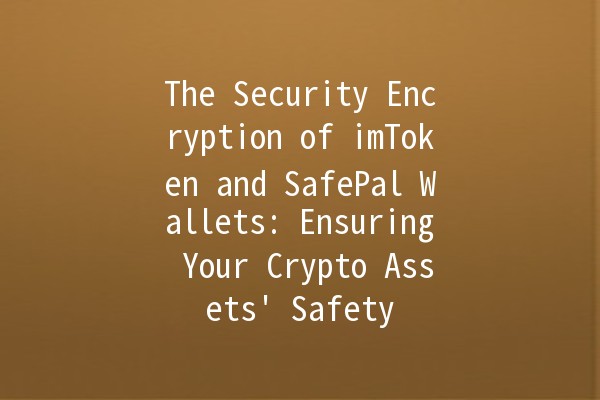In today's digital age, where cryptocurrencies are gaining widespread adoption, the importance of security encryption in cryptocurrency wallets cannot be overstated. imToken and SafePal are two prominent wallets in the market, each boasting unique security features. This article aims to delve into the security measures employed by these wallets and provide readers with practical tips on enhancing their crypto asset protection.
Cryptocurrency wallets serve as digital tools that allow users to store, manage, and interact with their cryptocurrencies. They come in various forms, including hardware wallets, software wallets, and mobile applications. Generally, wallets can be classified as either hot wallets (connected to the internet) or cold wallets (offline storage).

Encryption is a critical component of cyber security, especially in protecting sensitive information. For cryptocurrency wallets, encryption helps safeguard users' private keys, ensuring that only the rightful owner can access and manage their assets.
ImToken and SafePal leverage advanced encryption protocols to protect users, but the specifics can vary.
imToken is a popular choice for many cryptocurrency enthusiasts. The app provides several features designed to enhance security:
One of imToken's standout features is that it allows users to control their private keys. The private key is a crucial aspect of cryptocurrency ownership, enabling the signing of transactions.
Practical Tip: Always back up your private key in a secure location and never share it with anyone. You might store it in a physical safe or use a password manager to encrypt it.
ImToken provides a feature that allows users to swap tokens within the app. The swaps are secured and executed directly through decentralized exchanges, minimizing exposure to thirdparty risks.
Practical Tip: Before making any swaps, always doublecheck the token contract addresses to avoid scams.
For users with higher security needs, imToken offers multisignature wallets. This feature requires multiple keys to authorize a transaction, adding an extra layer of security.
Practical Tip: Consider setting up a multisignature wallet if you manage large amounts of cryptocurrency or share access with trusted partners.
SafePal is another excellent option, recognized for its robust security measures, especially its hardware wallet solution.
SafePal offers a hardware wallet that stores private keys offline, making them less susceptible to hacking attempts.
Practical Tip: To enhance security, consider using a hardware wallet in tandem with a software wallet. This creates a layered defense against online threats.
SafePal integrates a Secure Element (SE) chip, which is a tamperresistant platform capable of securely hosting applications and storing confidential data.
Practical Tip: Familiarize yourself with the features of the SafePal hardware wallet, and follow the manufacturer’s guidelines for updates and maintenance.
Regular updates help patch vulnerabilities and improve user experience. SafePal regularly updates its firmware, ensuring users with the latest security protocols.
Practical Tip: Enable automatic updates in your wallet settings to ensure you are always protected with the latest features.
While both imToken and SafePal provide security features, users should also take personal responsibility for their cryptocurrency assets. Here are five essential tips to enhance security:
Using a strong and unique password, along with enabling 2FA, adds an extra layer of protection for your wallets.
Practical Example: Use a password manager to create and store complex passwords. For 2FA, consider using apps like Google Authenticator.
Phishing attacks are one of the most common ways hackers target crypto users. Always check URLs and email addresses before entering sensitive information.
Practical Example: Bookmark official sites for imToken and SafePal to reduce the chances of falling victim to phishing websites.
Stay vigilant by regularly checking your wallet balances and transaction history to detect any unauthorized activity quickly.
Practical Example: Set a reminder to review your wallet activity weekly, allowing you to catch and report issues promptly.
Stay informed about new security threats and advances in wallet protection to make educated decisions about your assets.
Practical Example: Follow reputable cryptocurrency blogs or subscribe to newsletters focused on security in the cryptocurrency space.
Instead of keeping all your cryptocurrencies in one wallet, consider spreading your assets across different wallets. This strategy minimizes risk if one wallet is compromised.
Practical Example: Use your imToken wallet for daytoday transactions while storing a majority of your assets in the SafePal hardware wallet.
imToken is primarily a software wallet, offering features like token swapping and ease of use for mobile devices. SafePal, on the other hand, includes a hardware wallet option, providing an extra layer of security by keeping private keys offline.
Yes, combining both wallets can enhance your security strategy. You might use imToken for frequent transactions and SafePal for longterm storage.
Storing private keys in the cloud is not recommended due to potential hacking risks. It’s better to keep your private keys offline, either on paper or in a secure hardware wallet.
Most cryptocurrency wallets do not offer insurance on your assets. It is essential to take your own measures for safeguarding your keys and backups to avoid loss.
While mutations in technology provide new security measures, hacking incidents still occur. Statistics show increased cases around highvalue wallets; hence it’s crucial to practice good security habits.
It’s advisable to use multiple wallets for different purposes. You might keep some assets in a hot wallet for regular transactions and store the majority in a cold wallet for security.
, securing your cryptocurrency assets is a multifaceted approach that requires the use of reliable wallets like imToken and SafePal, combined with best practices in personal security. By understanding and utilizing the features offered by these wallets while implementing robust security measures, users can significantly reduce their risk and protect their investments in the everevolving world of cryptocurrency.